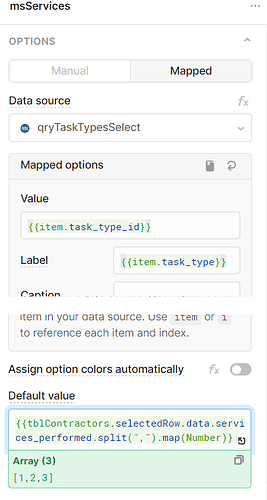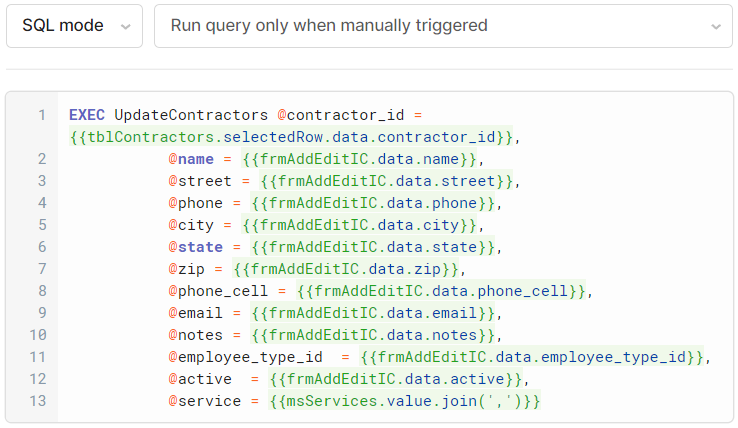I do almost this exact same thing with contractors/services performed. Here is how I solved it using SQL Server. If you are using Postgres or something else the syntax will be different, but certainly possible
I use STRING_AGG in my query to concatenate the IDs of the services like so (I also concat the service name for easy display in the table):
select c.*, q.services_performed, q.services_performed_desc, et.employee_type
from contractors c
join (select contractor_id, STRING_AGG(sp.task_type_id, ',') as services_performed, STRING_AGG (task_type, ',') as services_performed_desc
from contractor_service_performed sp
join lu_task_type tt on sp.task_type_id = tt.task_type_id
group by contractor_id) q on q.contractor_id=c.contractor_id
join lu_employee_type et on et.employee_type_id=c.employee_type_id
The result looks like this:
I am using a MultiSelect component to display the data:
The MultiSelect's data source is the lookup table (lu_task_type) and the secest is how I do the Default value:
I recently discovered a new trick with SQL sever that let's you pass back JSON ([how-to] Return JSON from SQL Server to cut down on server calls and improve performance) which is what I would do in the future, but STRING_AGG() works pretty well.
The next part is updating any changes and adding new records.
For that I use a a stored procedure.
First I call it like this:
Notice the .join(',') on @services, that makes a comma delim list of the Services Performed IDs to send back to the stored procedure.
And here is the stored procedure:
CREATE PROCEDURE [dbo].[UpdateContractors]
@contractor_id integer,
@name varchar(255),
@street varchar(255),
@phone varchar(25),
@city varchar(255),
@state varchar(255),
@zip varchar(255),
@phone_cell varchar(255),
@email varchar(255),
@notes text,
@employee_type_id int,
@active bit,
@service varchar(255)
AS
BEGIN
BEGIN TRY
BEGIN TRANSACTION
UPDATE [dbo].[contractors]
SET [name] = @name
,[street] = @street
,[phone] = @phone
,[city] = @city
,[state] = @state
,[zip] = @zip
,[phone_cell] = @phone_cell
,[email] = @email
,[notes] = @notes
,[employee_type_id] = @employee_type_id
,[active] = @active
WHERE contractor_id=@contractor_id
DELETE FROM contractor_service_performed
WHERE contractor_id=@contractor_id
INSERT INTO contractor_service_performed (contractor_id, task_type_id)
SELECT @contractor_id, value from STRING_SPLIT(@service,',')
COMMIT
END TRY
BEGIN CATCH
IF @@TRANCOUNT > 0
ROLLBACK TRANSACTION
SELECT ERROR_NUMBER(), ERROR_MESSAGE();
END CATCH
END
GO
First I update the contractors table, then I delete all related records in the contractor_service_performed table and then insert all of the new services into it. This way I don't need to worry about which were added or removed, I just start from scratch. I enclose all 3 in a transaction so relationships don't break due to an incomplete process.
You certainly could run these three queries within Retool without needing to make a stored procedure, but you lose the transaction capability.



